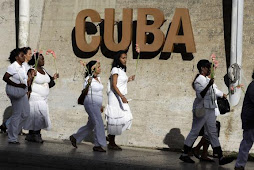Renewed relations with Cuba divide US opinion
Geoff Dyer
Difficult call: President Obama talks to President Castro in December
Barack Obama surprised the world in late December with the announcement
that he planned to normalise relations with Cuba, bringing to an end
more than five decades of diplomatic estrangement from the island nation
90 miles south of Florida.
In April, he held his first proper meeting with Cuba's President Raúl
Castro at a summit in Panama. "The United States will not be imprisoned
by the past; we are looking to the future," President Obama said. "I'm
not interested in battles that started before I was born."
But six months after the original announcement, what has emerged is a
much more patient and cautious opening between the former adversaries.
The Obama administration is working on two fronts. It is trying to use a
modest relaxation in business and trade with Cuba to press the
government into more political reform. At the same time, it hopes to
wear down resistance in the US Congress to a broader relaxation of the
nearly 55-year embargo. For US companies keen to jump into a new market,
it is likely to be a slow process.
So far, the administration's policy changes towards Cuba have been
limited to what is possible through executive orders issued by the
president.
The White House has made it somewhat easier for Americans to visit Cuba
and has issued a licence for a ferry service from Florida. Restrictions
remain, but tourists report there is little attempt by US authorities to
check whether they qualify for one of the 12 categories of approved
travel. Another order made it easier for US companies to sell
telecommunications equipment to Cuba.
In late May, the administration formally took Cuba off the list of state
sponsors of terrorism. While largely symbolic in terms of helping US
companies do business in the country, it is an important step in
legitimising relations.
US officials say an agreement is close on opening formal embassies — at
the moment, the US has an "interests section" in Havana.
Despite the hype, most restrictions on US companies remain. More
substantial changes will require Congress to start peeling back the web
of laws that make up the economic embargo.
"This is only the door cracking open," says Peter Kucik, a sanctions
specialist at the Inle Advisory Group in Washington. "It is the
beginning of the process."
How will Congress respond? One of the most surprising aspects of Mr
Obama's policy is how popular it has been. Not only have polls shown
broad public support for the push to normalise relations with Havana,
but some have shown a majority of Cuban-Americans in favour of the move.
In Congress, there has been bipartisan support. On board the plane to
Havana in December that brought home Alan Gross — a US contractor whose
release from a Cuban jail after five years was an effective prerequisite
for the Obama announcement — was Republican senator Jeff Flake.
Republican presidential hopeful and U.S. Senator Marco Rubio (R-FL)
answers questions from the audience at the Council on Foreign Relations
on May 13, 2015 in New York City
©Getty
But there is also a bipartisan group of members of Congress and other
senior figures who are bitterly opposed to any further rapprochement
with Cuba, including three potential candidates for the Republican
presidential nomination — senators Marco Rubio and Ted Cruz and former
Florida governor Jeb Bush.
In early June, the Floridian Mr Rubio said he would block efforts to
appoint an ambassador to Cuba if the administration did not first
introduce far-reaching political reforms and settle billions of dollars
of legal claims over property nationalised by the government.
Given such a climate over the idea of sending an ambassador to Havana,
few analysts are expecting Congress to make any significant changes to
Cuba sanctions legislation in the near future.
As a result, the administration is developing a longer-term strategy of
using modest changes to build a case for relaxing more restrictions. The
changes to date have been designed to encourage the sorts of private
entrepreneurship that escape the controls of the state — an oblique way
of putting pressure on the Cuban government but also of showing critics
at home the potential for further engagement.
By making it easier for US companies to export telecoms equipment to
Cuba, the administration is clearly trying to boost the sort of internet
access and other communications that might subtly undermine political
control.
Last month, US-based IDT Corporation announced that it had signed a
contract with the Cuban telecom company to provide direct phone links
between the two countries.
After Mr Rubio used a recent Senate hearing to claim the Cuban
government would be the main beneficiary of more US tourists, Mr Flake
brought out his tablet to show off the new operation in Cuba of Airbnb,
the holiday home rental site. "If you just scroll down, they have now
more than 2,000 listings in Cuba," he said. "Virtually all these
listings are people in their homes."
Ted Piccone, an expert on Latin America at the Brookings Institution in
Washington, says that Airbnb's Cuban business is a good example of "how
US companies can do business in Cuba in ways that empower Cuban people"."
Source: "Renewed relations with Cuba divide US opinion" -
http://www.ft.com/cms/s/0/b20f6a6e-fb0b-11e4-9aed-00144feab7de.html#axzz3dPBTVbFP
Subscribe to:
Post Comments (Atom)





No comments:
Post a Comment